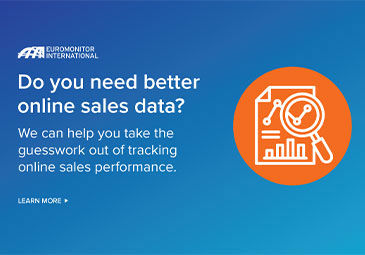This article was originally published in Forbes on 29 November 2022.
Consumers are spending less time in grocery stores compared with the pandemic peaks. Grocery retailers and brands have turned to social media platforms to reach these consumers.
Online grocery shoppers are avid social media users. And, no surprise, Gen Z is the most prolific. Those consumers who shopped for food and beverages online used social media apps more frequently, according to Euromonitor International’s 2022 Voice of the Consumer: Digital Survey. YouTube, Facebook and Instagram are the top social platforms among food and beverage online shoppers, but this trend is true across the major platforms.
How grocers are using social commerce
Social commerce, or s-commerce, continues to change how consumers interact with brands. Texas-based grocery chain H-E-B started a weekly interactive cooking series on Zoom in 2020, later moving to Facebook, when it added livestreaming capabilities. The series features local chefs, and allows viewers to purchase the H-E-B products used in each tutorial, down to the chef’s bowls.
Albertsons is leveraging technology from Pinterest to recommend meals to shoppers based on their searches and purchase history. The retailer also now positions associates as influencers, and has added shoppable videos to its website. These moves are part of the grocer’s strategy to drive engagement and tap into s-commerce.
Social commerce is growing rapidly – outpacing the broader e-commerce market. S-commerce will expand from 3% of total e-commerce sales in 2022 to an estimated 6% in 2027, according to new data from Euromonitor. In 2022, s-commerce was a nearly a quarter billion-dollar market[1] and is expected to cross USD700 billion in 2027. But a successful strategy goes beyond making these platforms shoppable. Of those who purchased food and beverages online, only 34% have made a purchase via social platforms, according to Euromonitor’s 2022 Voice of the Consumer: Digital Survey.
That is because social commerce is also about building an online community of loyal shoppers. Social channels are how a lot of shoppers discover new products, recipes, and potentially even grocery websites. And, if you want to capture the emergent purchasing power of Gen Z, social is your answer.
Reaching the next generation of shoppers
Known for their activism and authenticity, Gen Z shoppers expect retailers and brands to go beyond merely advertising to also showcasing their brand ethos. They want to know where a company stands in areas including sustainability and diversity.
This up-and-coming generation wants to see value in their brand interactions, and will only shop from businesses that they can trust. In fact, 30% of Gen Z consumers made purchase decisions based on brands’ social and political beliefs, up 5% from 2020, according to Euromonitor’s 2022 Voice of the Consumer: Lifestyles Survey.
TikTok is the network to reach this generation, with 60% of Gen Z using the short-form video platform globally – the most of any age group. In fact, TikTok is outpacing competitors in terms of new users across all age groups, according to a comparison of Euromonitor’s annual surveys.
Leading US grocery retailer Walmart added TikTok and Snapchat to its Connect advertising network in September to enable brands to connect to these important Gen Z platforms directly. Misfits Market, the online value grocer and subscription box for fresh produce, shifted to more short-form video content for TikTok and Instagram Reels in the last two years, and added personalities to its TikTok account in 2022 to reach Gen Z shoppers.
Commerce and social are now synonymous, and the grocery channel is no exception. Social media is a must-have tool to reach digitally-driven shoppers today, and these platforms are even more critical for Gen Z.
Building a strategy to win over Gen Z requires more than simply duplicating a store-based campaign. Gen Z shoppers crave storytelling, connection and purpose in their brand engagement. They have upped the ante for grocery retailers and brands. Not only do these players need to stand for something, but they must also deliver authentic customer experiences.
[1] Across 30 markets where Euromonitor conducts this research.
For further analysis and insight, read our report, Digital Disruptors: The Global Competitive Landscape of Social Media.

